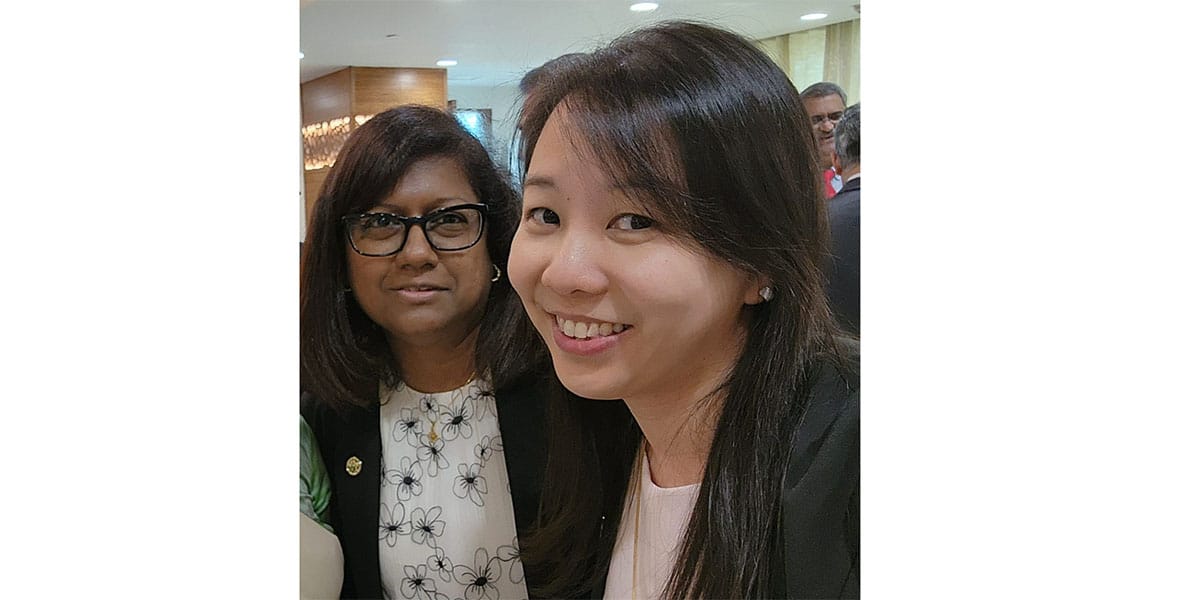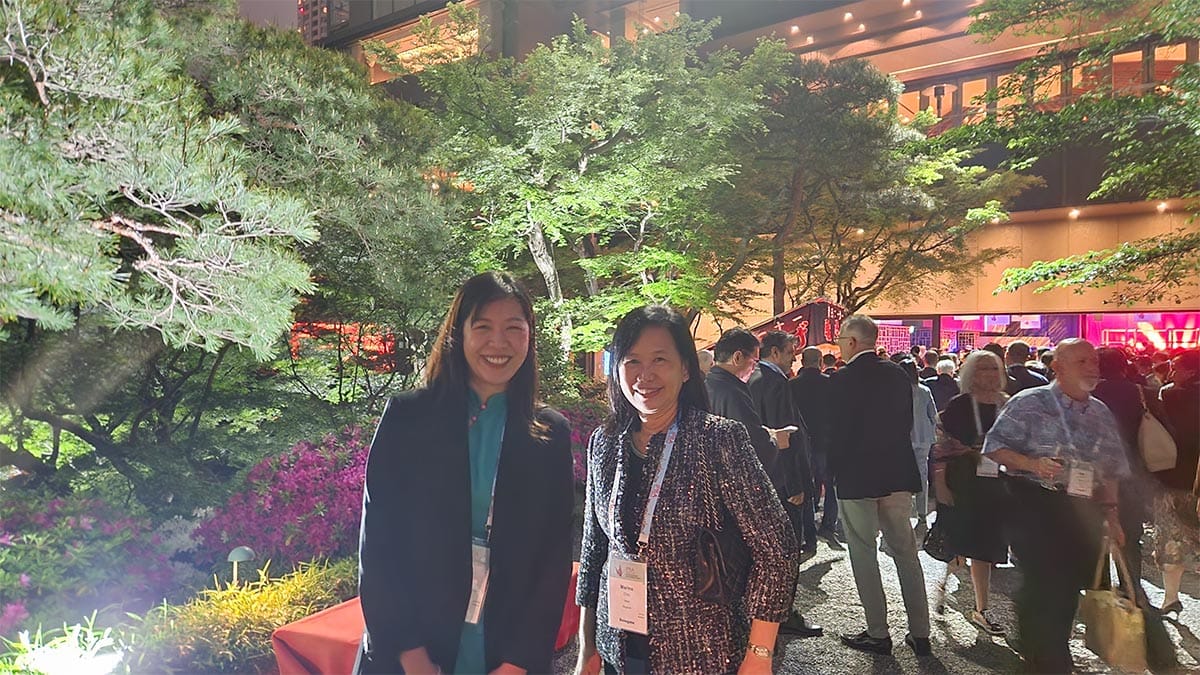Maternal Mentoring: Marina Chin SC, Valerie Wu, Gloria James-Civetta
With Mother's Day around the corner, we speak to senior female lawyers and their mentees about how they are nurturing the next generation.

BY MATHANGI ELANGOVAN
Mentorship in the legal profession has been in the spotlight lately: the recent Interim Report of the Ethics and Professional Standards Committee shed light on the need for more structured mentorship and the outsized role mentors play in fostering a conducive work culture.
To better understand how senior lawyers can infuse mentorship into their team’s culture, we’ve profiled three women who have made mentorship a daily mantra. Most happen to be mothers but all display a commitment to nurturing and teaching, just as any parent would.
In fact, their relationships sometimes resemble mother-daughter pairs: they are proud of the other’s accomplishments, lend encouragement and accompany one another in social activities. They are even there during personal milestones; Ms Alcina Chew remembers how Ms Marina Chin SC was an early visitor after she gave birth to her first child. “She held her for a good hour,” she recalls with a laugh.
Despite their different backgrounds and practice areas, several common threads run through their responses: they all firmly believe in advocating for their juniors and giving them opportunities to grow, sometimes even at the expense of productivity. But as one put it, “If it means that they will grow to become a better and more ethical lawyer, then it’s worth it.”
A RELATIONSHIP ROOTED IN MUTUAL RESPECT
Ms Gloria James-Civetta, Head Lawyer, Gloria James-Civetta & Co
Ms Liesel Chong, Head, Dispute Resolution Practice, Gloria James-Civetta & Co

In a cutthroat profession like the law, a word of encouragement can go a long way. Just ask Liesel, who grappled with failing the Mediation Skills Assessment the first time she took it. “Gloria said, ‘No lah, just do it again, I’m sure you can do it.’ I wondered where that trust and confidence came from, since I certainly didn’t feel it for myself. But coming from her it was very encouraging and it was the boost that I needed to try again. She provided the materials, helped me with the preparations and I’m happy to say, I passed!”
Gloria explains just why she has so much faith in Liesel, who is 21 years her junior. “With Liesel I don’t have to worry too much. She is the only lawyer in our firm who is an all-rounder. You can throw her a civil, criminal, or family law case and she can manage any of them. She is the ideal role model for the rest of the lawyers in the firm.”
They both are proud of their mentor-mentee relationship, sharing that it’s one rooted in humility, good faith and mutual respect. Gloria knows a thing or two about how important such qualities; after all, she was mentored by giants in the profession, including Mr Subhas Anandan and Mr Sreenivasan Narayanan SC.
Gloria, tell us about your mentors.
Gloria James-Civetta (GJ): Each had their own style. I did my pupilage with Mr Sreeni and till today, he jokes that I’m the pupil that he let go of. I hope he means that he made a bad decision back then.
And to Mr Subhas, I was first known as the girl that lived three doors down from his mother. He remembered seeing me as a teenager and when I came into practice, he said, ‘I remember you.’ When I told him I was interested in criminal and family law, he took me under his wing, saying ‘I’m going to expose you to it.’
He would organise lunches at the Cricket Club for me to meet the likes of Mr Harry Elias SC and Mr Joseph Grimberg SC. Both men were generous with their networks and time. When Subhas passed away, I was really affected. He was a father figure to me.
Liesel, how do you think that has impacted Gloria’s mentorship style.
Liesel Chong (LC): I think it’s made her aware of the importance of opening doors. As a woman she juggles so many demanding roles at one time: running a firm, being a daughter, daughter-in-law, sister. I’ve learnt a lot about balance watch her navigate this reality.
Gloria also exemplifies leading by example. She is always upskilling, taking courses and improving herself—with her, you know it’s not just a buzzword, but a way of life. Like her mentors before her, Gloria is also always available for us. There was once that she was on the phone with us, taking questions even when she was on the way to the airport, all the way till the plane!
Gloria, you are also a volunteer with SINDA. Why are you so passionate about mentoring?
GJ: As you develop, you sometimes need someone to give you a push. That could mean anything from getting advice on what to do or how to project yourself. They need to be pointed in the right direction and only a mentor can do that.
STYLE AND SUBSTANCE
Ms Valerie Wu, Head of Tax & Private Wealth (Asia), Pinsent Masons
Ms Zhu Lin, Associate, Pinsent Masons

Over their six years of working together, Zhu Lin has learnt a lot from Valerie. These lessons weren’t confined to the office—Zhu Lin fondly recalls shopping together and noticing how decisive Valerie was when it came to buying her clothes. “On the other hand, I took a really long time to decide on anything. But watching Valerie has made me aware of the importance of being decisive, be it at work or play.”
Zhu Lin was also struck by Valerie’s ability to look beyond her grades, which in her own words, were far from stellar. “I had been interviewing at other firms, where my grades were scrutinised a lot. But Valerie gave me a chance, which I’m grateful for.”
To this, Valerie turns to a Chinese idiom (天生我才必有用 – tian sheng wo cai bi you wong), which means that everyone has something to give. “And I myself didn’t have good grades at law school because I was a very naughty student. I believe that we really can show our value when we actually put our heart to things.”
Valerie, what’s the advantage of having a good mentor?
Valerie Wu (VW): A mentor would have racked up some experience and they can tell you things you may not learn elsewhere. For example, that some issues have nothing to do with how good you are in the law, or how strong your technical analysis is—because there are many others who can do the same. What’s more important is valuing the relationship and relationship management. This is an area that a good mentor can help you excel in.
Zhu Lin, could you recount an instance of Valerie being such a mentor to you?
Zhu Lin: Time is the most important thing you have in life—and Valerie has proven time and again how generous she is with her time. Five years ago, I was struggling to draft a piece of advice. But Valerie insisted that I would be able to and sat with me for more than two hours to help. She witnessed me crying, laughing and being hysterical. Through all that she just really wanted me to be the one to be able to do that paragraph, even though it would have probably taken her just 5 minutes to do it. Very appreciative of her for believing in me and helping me.
As women, what’s the value of having a fellow female as a mentor?
VW: As a female lawyer, it’s even more important to have another woman as your mentor, because they would understand uniquely the kind of challenge that you face or they have faced and they’d be able to guide you on that.
ZL: I think as an Asian woman, at least for myself, I am very prone to doubting myself. So it’s good to see that there’s someone who has been through a similar journey and if you strive at it, you too can become someone who’s decisive, assertive and calm.
HER BIGGEST ADVOCATE
Ms Marina Chin SC, Joint Managing Partner of TKQP
Ms Alcina Chew, Partner of TKQP

Advocacy can be a useful tool outside the court room, and even in the context of mentorship—not least putting up a case for your juniors to have new experiences to further their growth and development as lawyers. And who better to make your case for you than a Senior Counsel?
Alcina’s mentor, Marina, has actively advocated for opportunities for her, be it taking the lead in court or attending overseas conferences. “Marina’s support and mentorship have been invaluable,” says Alcina, who has been with the firm since her traineeship.
Marina remembers her well from those days. “We could tell at that point that Alcina was a very promising young lawyer. And she’s proven that she is.” She is also pleased that Alcina, who is more senior now, has followed in her footsteps of mentoring the next generation. “I think it’s very useful for the young ones to talk to someone like Alcina—it doesn’t have to be someone as senior as me. In fact, they might have more in common with Alcina because of greater proximity in age.”
Marina, why is mentorship important in the legal profession?
Marina Chin (MC): Over the years, the profession has probably lost a lot of female lawyers because of the unique challenges they face playing the multiple roles of wife, mother and/or daughter. It should not be the case that they leave because alternatives have not been explored and they are left with Hobson’s choice. It’s a great loss for the exiting professional and the profession.
But it doesn’t have to be that way. Mindsets have to change of course. But with a good mentor watching out for you and with whom you can bounce off your ideas and concerns, solutions can sometimes be found. In my time as a young lawyer, there was not so much of that. So I suspect we have lost some lawyers—whom we might otherwise have salvaged—if only they had the benefit of more mentorship.
What are some values a mentor should embody?
MC: A listening ear, EQ and positivity. That said, there is no one-size-fits-all mentorship code.
Alcina, what have you learnt from Marina over the years?
Alcina Chew (AC): First and foremost is the importance of hard work. There is no substitute for hard work and putting in the hours to really understand your case and the law.
The second thing is the importance of balance. Marina has been a very important role model for me as a lawyer and as a mother. We don’t have many examples that show that it’s possible to balance these roles, so having a role model helps mentees see that it’s possible.

